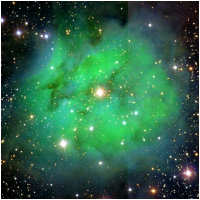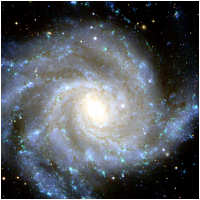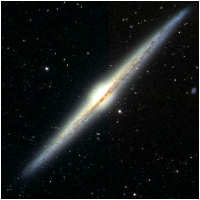Galaxy Zoo
Let us speak of "Web 2.0": which names would cross your minds, first? Probably Wikipedia, Facebook, MySpace, YouTube, Flikr, Digg, del.icio.us, Technorati, or LinkedIn, just to mention fews.
It is a very heterogeneous set, since those sites are used for many different purposes: Digg and del.icio.us are social bookmarking services; Facebook and LinkedIn are oriented to social networks; MySpace, YouTube, and Flikr are mostly used by people to promote themselves by sharing their own works, info, images; Technorati is dedicated to blogs and news.
The only site out of that list mentioned above which was really intended to generate content by taking advantage of collective intelligence is Wikipedia. Of course there are other sites to co-generate content, but most of the so-called Web 2.0 sites seems to be more oriented to support the desire of people to know and to be known rather than committed on some socially useful goal.
Furthermore Web 2.0 is going to become synonym of nice graphics, text art, mirroring effects, colorful sites. It is not a case that Wikipedia, one of the few sites really committed to generate value for everybody, is not so focused on the typical modern layouts and styles of the most popular Web 2.0 sites. Serious Web 2.0 sites committ on content.
Web 2.0 is a powerful paradigm, an opportunity to drive the web to become what was really intended when it was created: a place where all of us works together to share and improve any kind of content: data, information, knowledge. That is why I think it is important to signal those sites which really got the spirit of what Social Web should be.
One of these site is, in my personal opinion, Galaxy Zoo. Scientific experiments are collecting all over the world larger and larger amounts of data. Most of those data require human analysis to be classified and elaborated. A preliminary stage of analysis often does not require specialist know-how and could be performed also by any individual with an average schooling degree. An example is the classification of galaxies as clockwise and counterclockwise spirals or ellipticals.
In fact, since the Sloan Digital Sky Survey (SDSS) began to take images of a large portion of the sky, it found and is still finding millions galaxies. With such a large number of galaxies, astronomers can finally begin to better understand our universe. However such an amount of data is too huge to be managed by a limited amount of people. Here is why Galaxy Zoo was promoted.
Galaxy Zoo is a world-wide collaboration initiative that take advantage of volunteers to classify galaxies. Practically, everybody can register and, once passed a simple test, begin to browse through the photo gallery to assign to each image a classification. Very simple, very effective, extremely useful. The mechanism works because it has not to rely on a single judgment for each image, but on the assessment performed by many people for each single candidate. The more people assess an image, the more reliable will be the assessment.
In my personal opinion this is the real value of Web 2.0: take advantage of collective intelligence to exponentially improve our ability to solve problems, better understand the world where we live, and support social initiative. Sharing knowledge is useless, unless we have goals. This is why I strongly recommend everybody who is interested to give a contribute to create a better world, to participate to initiatives like Galaxy Zoo. Their site looks like a traditional Web 1.0 site, but it is not: it is more Web 2.0 than many other sites that pretends to be new.
Of course, Galaxy Zoo is only one of the many social projects that have been published in the web in the last few years. I expect that in future we will have more and more real Web 2.0 site committed to solve any kind of problems, as famine or mortal diseases, for example. All of us might lend a hand to prevent accidents, solve technical problems, find any kind of solution for any kind of problems The success factor would be not based on single brilliant ideas – it could be, but do not rely on them – but on the ability to refine else’s idea in a collaborative iteration process based on the contribute of average minds, not necessarily geniuses.
Because of Web 2.0, the evolution of humanity will eventually be the outcome of the contribution of the whole human kind, not just single brilliant individuals, and each of us may say: «I did it!».























The McDonald restaurant at the end of Universe?
Paradigm Bookmarks
[..] Bookmarked your page with keywords paradigm! [..]